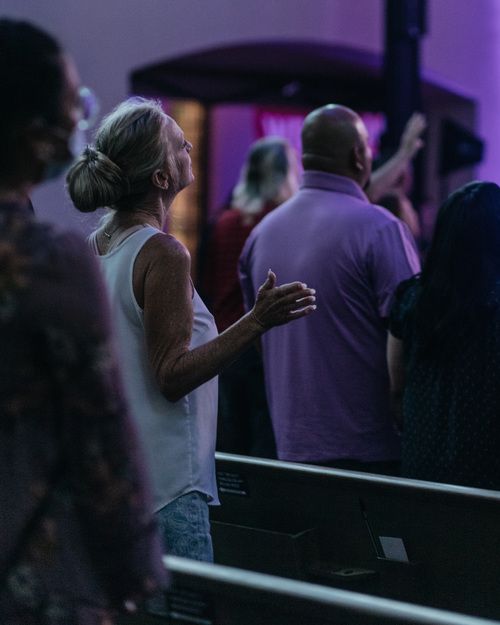Thursday Devo

Scripture Reading:
Isaiah 6
It was in the year King Uzziah died that I saw the Lord. He was sitting on a lofty throne, and the train of his robe filled the Temple. 2 Attending him were mighty seraphim, each having six wings. With two wings they covered their faces, with two they covered their feet, and with two they flew. 3 They were calling out to each other,
“Holy, holy, holy is the Lord of Heaven’s Armies!
The whole earth is filled with his glory!”
4 Their voices shook the Temple to its foundations, and the entire building was filled with smoke.
5 Then I said, “It’s all over! I am doomed, for I am a sinful man. I have filthy lips, and I live among a people with filthy lips. Yet I have seen the King, the Lord of Heaven’s Armies.”
It was in the year King Uzziah died that I saw the Lord. He was sitting on a lofty throne, and the train of his robe filled the Temple. 2 Attending him were mighty seraphim, each having six wings. With two wings they covered their faces, with two they covered their feet, and with two they flew. 3 They were calling out to each other,
“Holy, holy, holy is the Lord of Heaven’s Armies!
The whole earth is filled with his glory!”
4 Their voices shook the Temple to its foundations, and the entire building was filled with smoke.
5 Then I said, “It’s all over! I am doomed, for I am a sinful man. I have filthy lips, and I live among a people with filthy lips. Yet I have seen the King, the Lord of Heaven’s Armies.”
Commentary from the ESV Study Bible:
6:1 In the year. Around 740 b.c. King Uzziah died, marking the end of a lengthy era of national prosperity (see 2 Chronicles 26).
6:1 Isaiah’s vision of the glory of God anticipates the glory of God in Christ (John 1:14; 12:41; Rev. 4:2–10).
6:2 the seraphim. Fiery angelic beings (the Hb. word serapim means “flames”). Six wings suggest remarkable powers. The references to face and feet, with their capacity for speech in vv. 3 and 7, and “his hand” in v. 6, imply composite creatures, such as are represented in ancient Near Eastern art. he covered. Even a perfect, superhuman creature humbles himself before the all-holy God.
6:3 Holy, holy, holy. The threefold repetition intensifies the superlative (cf. Rev. 4:8). Holiness implies absolute moral purity and separateness above the creation (see note on Isa. 1:4). his glory. This is a technical term for God’s manifest presence with his covenant people. It was seen in the cloud in the wilderness (Ex. 16:7, 10); it moved in to “fill” the tabernacle (Ex. 40:34–35) and then the temple (1 Kings 8:11), where the worshipers could “see” it (Ex. 29:43; Ps. 26:8; 63:2). Several passages look forward to the day when the Lord’s glory would fill the earth, i.e., the whole world will become a sanctuary (Num. 14:21; Ps. 72:19; Hab. 2:14; cf. Isa. 11:9); and the ESV footnote suggests that the seraphic cry shares this anticipation. Other texts in Isaiah also look forward to the revealing of the Lord’s glory to the world (11:10; 35:2; 40:5; 58:8; 59:19; 60:1–2; 66:18). John 1:14 asserts that this glory was present in Jesus.
6:4–5 The revelation of the Holy One is disturbing (see Ex. 19:16–18). Woe is me! For the first time in the book, Isaiah speaks, and his word is a prophetic woe against himself. He confesses his unclean (i.e., not permitted in God’s presence) lips, unlike the seraphic choir, whose worship is pure. I dwell in the midst. Isaiah’s generation is unfit for God, and Isaiah himself is no better. my eyes have seen the King. The holiness of the King is such that the very sight of him seems as though it would be fatal to a sinner (cf. Gen. 32:30; Ex. 33:20; Isa. 33:14).
6:1 Isaiah’s vision of the glory of God anticipates the glory of God in Christ (John 1:14; 12:41; Rev. 4:2–10).
6:2 the seraphim. Fiery angelic beings (the Hb. word serapim means “flames”). Six wings suggest remarkable powers. The references to face and feet, with their capacity for speech in vv. 3 and 7, and “his hand” in v. 6, imply composite creatures, such as are represented in ancient Near Eastern art. he covered. Even a perfect, superhuman creature humbles himself before the all-holy God.
6:3 Holy, holy, holy. The threefold repetition intensifies the superlative (cf. Rev. 4:8). Holiness implies absolute moral purity and separateness above the creation (see note on Isa. 1:4). his glory. This is a technical term for God’s manifest presence with his covenant people. It was seen in the cloud in the wilderness (Ex. 16:7, 10); it moved in to “fill” the tabernacle (Ex. 40:34–35) and then the temple (1 Kings 8:11), where the worshipers could “see” it (Ex. 29:43; Ps. 26:8; 63:2). Several passages look forward to the day when the Lord’s glory would fill the earth, i.e., the whole world will become a sanctuary (Num. 14:21; Ps. 72:19; Hab. 2:14; cf. Isa. 11:9); and the ESV footnote suggests that the seraphic cry shares this anticipation. Other texts in Isaiah also look forward to the revealing of the Lord’s glory to the world (11:10; 35:2; 40:5; 58:8; 59:19; 60:1–2; 66:18). John 1:14 asserts that this glory was present in Jesus.
6:4–5 The revelation of the Holy One is disturbing (see Ex. 19:16–18). Woe is me! For the first time in the book, Isaiah speaks, and his word is a prophetic woe against himself. He confesses his unclean (i.e., not permitted in God’s presence) lips, unlike the seraphic choir, whose worship is pure. I dwell in the midst. Isaiah’s generation is unfit for God, and Isaiah himself is no better. my eyes have seen the King. The holiness of the King is such that the very sight of him seems as though it would be fatal to a sinner (cf. Gen. 32:30; Ex. 33:20; Isa. 33:14).
Study Questions:
- Even though people use different adjectives to describe God in Scripture, the result is always the same. When people actually see the glory of God they faint, fall, throw themselves down on the ground. We're human so we have no capacity to fully comprehend God. We are like a cheap camera trying to capture the glory of a sunset. The answer to almost any problem we have in this life is a more accurate view of the majesty and glory of God. We talk about him, casually toss up these flippant little prayers. We forget that if we actually SAW him, we'd say nothing! We'd be speechless. Think about this... what if God gave you a glimpse of himself? What if you got to see him, in person, for just 10 seconds? During those 10 seconds, what do you think you'd be thinking about? What would you be feeling?
- Isaiah begins Chapter 6 talking about the time God gave him a glimpse into the unseen world. And he makes a point to begin by saying it was the year King Uzziah died. For Israel, when they had a good and faithful king, things went very well for them. If they had a bad king, that was disobedient to God, things went very wrong. King Uzziah had been a good and faithful king for 52 years, and Israel had prospered as a result. And now he was dead, and fear and uncertainty loomed. It's interesting that this was the time God was choosing to reveal himself to Isaiah. He didn't counsel him or help him deal with his feelings. It's almost like he told Isaiah, "I know you're afraid, but let me show you something... let me show you who is REALLY on the throne." What in your life is blotting out the sun, keeping you in darkness? What problem is so big that you can't see past it? What issue has grown so large that it's making your God seem very small? If you could truly see the greatness of God, how would it change your perspective on your life and your struggles?
Pray:
- That you would be in awe of God's greatness today.
- That you would let his greatness change your perspective.
This Week's City 7:
Try to commit to memory!
2. Are there sources outside the Bible that confirm the Biblical account of Jesus’ resurrection from the dead? Many Roman and Jewish historians have confirmed that the apostles died as martyrs for preaching that they saw Jesus risen from the grave. No one dies for something they know to be a lie.
(Luke 1:1-4; Acts 26:26; 1 John 1:1-4, Josephus, Clement, Hegesippus, Tertullian, Origen, Polycarp)
(Luke 1:1-4; Acts 26:26; 1 John 1:1-4, Josephus, Clement, Hegesippus, Tertullian, Origen, Polycarp)

No Comments